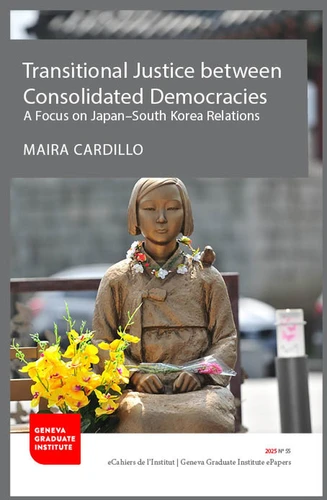Transitional Justice between Consolidated Democracies. A Focus on Japan–South Korea Relations
Par :Formats :
Disponible dans votre compte client Decitre ou Furet du Nord dès validation de votre commande. Le format Multi-format est :
- Pour les liseuses autres que Vivlio, vous devez utiliser le logiciel Adobe Digital Edition. Non compatible avec la lecture sur les liseuses Kindle, Remarkable et Sony
 , qui est-ce ?
, qui est-ce ?Notre partenaire de plateforme de lecture numérique où vous retrouverez l'ensemble de vos ebooks gratuitement
Pour en savoir plus sur nos ebooks, consultez notre aide en ligne ici
- FormatMulti-format
- ISBN978-2-940600-59-5
- EAN9782940600595
- Date de parution13/01/2025
- Protection num.NC
- Infos supplémentairesMulti-format incluant PDF avec W...
- ÉditeurGraduate Institute Publications
Résumé
This theoretical study examines the Korean 'comfort women' dispute and its impact on diplomatic relations between Japan and the Republic of Korea to explore how the pool of transitional justice can be exploited for diplomatic reconciliation. Korean 'comfort women' refers to the more than two hundred thousand Korean girls and women forcibly recruited as sexual slaves for the Japanese Imperial Army during the Second World War.
The main research question guiding this paper is how can measures of transitional justice (TJ) contribute to a long-term reconciliation of diplomatic bilateral relations between Japan and the Republic of Korea. This case study demonstrates how TJ can transcend its traditional definitions and be adapted in diverse contexts for various scopes. It seeks to challenge and reinterpret the current literature on TJ by extending its normative purposes beyond conflict prevention and democratisation.
Through the Japan-Republic of Korea example, the research uses TJ revelatory measures of truth-telling and collective memory to normalise unsettled interstate diplomatic relations between two consolidated democracies. Using a sociological and historical perspective, this work is an attempt to explore a novel application of TJ, contributing to the scholarly debate by demonstrating the enormous potential of TJ to be remodelled to non-transitioning and non-conflicting contexts that have yet to address historical legacies of past atrocities.
We extend our heartfelt thanks to the Vahabzadeh Foundation for financially supporting the publication of best works by young researchers of the Graduate Institute, giving a priority to those who have been awarded academic prizes for their master's dissertations.
The main research question guiding this paper is how can measures of transitional justice (TJ) contribute to a long-term reconciliation of diplomatic bilateral relations between Japan and the Republic of Korea. This case study demonstrates how TJ can transcend its traditional definitions and be adapted in diverse contexts for various scopes. It seeks to challenge and reinterpret the current literature on TJ by extending its normative purposes beyond conflict prevention and democratisation.
Through the Japan-Republic of Korea example, the research uses TJ revelatory measures of truth-telling and collective memory to normalise unsettled interstate diplomatic relations between two consolidated democracies. Using a sociological and historical perspective, this work is an attempt to explore a novel application of TJ, contributing to the scholarly debate by demonstrating the enormous potential of TJ to be remodelled to non-transitioning and non-conflicting contexts that have yet to address historical legacies of past atrocities.
We extend our heartfelt thanks to the Vahabzadeh Foundation for financially supporting the publication of best works by young researchers of the Graduate Institute, giving a priority to those who have been awarded academic prizes for their master's dissertations.
This theoretical study examines the Korean 'comfort women' dispute and its impact on diplomatic relations between Japan and the Republic of Korea to explore how the pool of transitional justice can be exploited for diplomatic reconciliation. Korean 'comfort women' refers to the more than two hundred thousand Korean girls and women forcibly recruited as sexual slaves for the Japanese Imperial Army during the Second World War.
The main research question guiding this paper is how can measures of transitional justice (TJ) contribute to a long-term reconciliation of diplomatic bilateral relations between Japan and the Republic of Korea. This case study demonstrates how TJ can transcend its traditional definitions and be adapted in diverse contexts for various scopes. It seeks to challenge and reinterpret the current literature on TJ by extending its normative purposes beyond conflict prevention and democratisation.
Through the Japan-Republic of Korea example, the research uses TJ revelatory measures of truth-telling and collective memory to normalise unsettled interstate diplomatic relations between two consolidated democracies. Using a sociological and historical perspective, this work is an attempt to explore a novel application of TJ, contributing to the scholarly debate by demonstrating the enormous potential of TJ to be remodelled to non-transitioning and non-conflicting contexts that have yet to address historical legacies of past atrocities.
We extend our heartfelt thanks to the Vahabzadeh Foundation for financially supporting the publication of best works by young researchers of the Graduate Institute, giving a priority to those who have been awarded academic prizes for their master's dissertations.
The main research question guiding this paper is how can measures of transitional justice (TJ) contribute to a long-term reconciliation of diplomatic bilateral relations between Japan and the Republic of Korea. This case study demonstrates how TJ can transcend its traditional definitions and be adapted in diverse contexts for various scopes. It seeks to challenge and reinterpret the current literature on TJ by extending its normative purposes beyond conflict prevention and democratisation.
Through the Japan-Republic of Korea example, the research uses TJ revelatory measures of truth-telling and collective memory to normalise unsettled interstate diplomatic relations between two consolidated democracies. Using a sociological and historical perspective, this work is an attempt to explore a novel application of TJ, contributing to the scholarly debate by demonstrating the enormous potential of TJ to be remodelled to non-transitioning and non-conflicting contexts that have yet to address historical legacies of past atrocities.
We extend our heartfelt thanks to the Vahabzadeh Foundation for financially supporting the publication of best works by young researchers of the Graduate Institute, giving a priority to those who have been awarded academic prizes for their master's dissertations.



